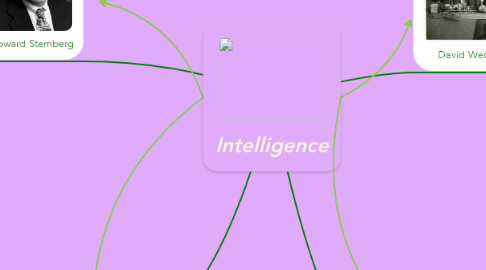
1. Howard Sternberg
1.1. "Part of intelligence is the ability to achieve personal goals."
1.1.1. Successful Intelligence Theory
1.1.1.1. Practical Ability
1.1.1.1.1. Adapting to one's environment
1.1.1.1.2. Shaping one's environment
1.1.1.1.3. Selecting a different environment
1.1.1.2. Creativity Ability
1.1.1.2.1. Solving novel and unfamiliar problems
1.1.1.3. Analytical Ability
1.1.1.3.1. Using prior knowledge and cognitive skills to solve problems and learn new information
2. Intelligence Tests
2.1. What do IQ test measues vs. don't meseaure.
2.1.1. intelligence is limited by the fact that it cannot be measured directly .
2.1.2. Intelligence we test is a simple of intellectual capabilities that relate to classroom achievement.
2.1.3. current research demonstrates that cognitive abilities measured by intelligence test can be improved with systematic instruction
2.1.4. IQ tests are designed to predict academic success, anything that has to do with classroom learning.
2.1.5. IQ test do not measure others characteristics that make significant contributions to academic and life success.
3. David Wechsler
3.1. "Intelligence involves more that what intelligence tests measures."
3.1.1. The global capacity of individual to act with purpose, think rationally, and deal with our environment.
3.1.2. People display intelligence in places out side the classroom such as; at work , home, or playing.
3.1.3. Other intelligence behaviors contribute such as persistence, realistic goal setting, productive use of feedback, creativity and moral & aesthetic values.
4. Robert Gardner
4.1. "Intelligence is composed of 8 distinct forms of intelligence."
4.1.1. Logical-mathematical
4.1.1.1. Logical-mathematical Sensitivity to/and capacity to discern, logical or numerical patterns; ability to handle long chains or reasoning.
4.1.2. Linguistic
4.1.2.1. Sensitivity to sound, rhythms, and meanings of words.
4.1.3. Musical
4.1.3.1. The abilities to produce and appreciate rhythms, pitch, and appreciation of all forms of musical expression.
4.1.4. Spatial
4.1.4.1. Capacities to perceive the verbal-spatial world accurately and to perform transformations on one's initial perceptions.
4.1.5. Bodily-Kinesthetic
4.1.5.1. To control one's movements and handle objects skillfully.
4.1.6. Interpersonal
4.1.6.1. Capacities to discern and respond appropriately to moods, temperaments, motivations and desires of others.
4.1.7. Intrapersonal
4.1.7.1. Know one's own feeling and the ability to draw form them for a guild to behavior, knowledge of one's own strengths, weaknesses, and desires.
4.1.8. Naturalist
4.1.8.1. To have the ability to identify numerous plants and animals in ones environment .
